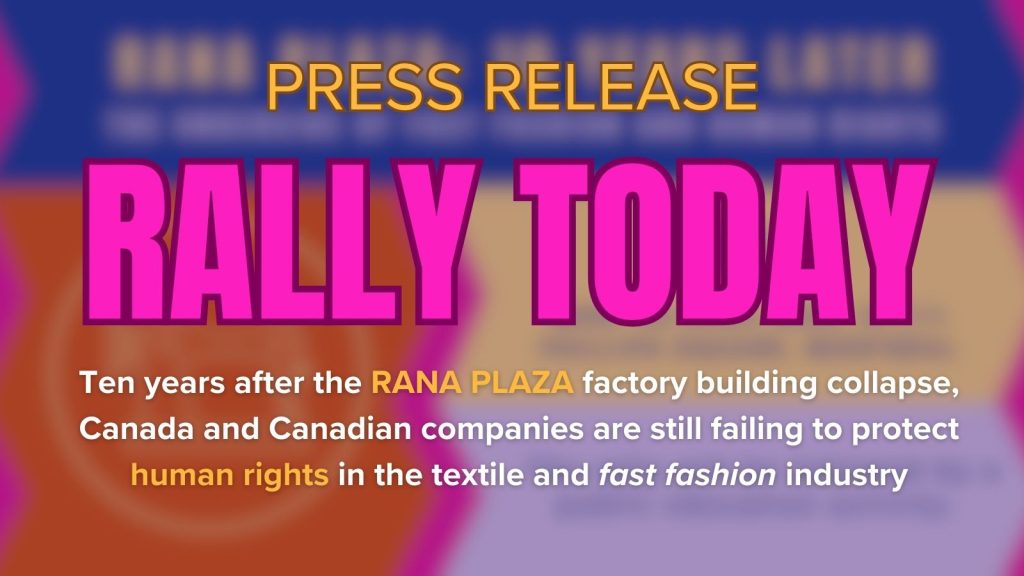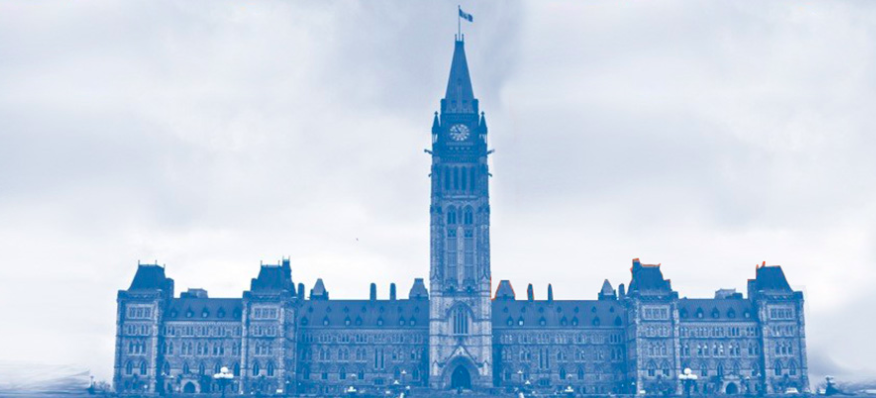MONTREAL – Ten years after the collapse of the Rana Plaza factory building, which killed more than 1,130 textile workers and injured more than 2,500 others, the majority of whom were women, Canada and Canadian companies are not doing their part to prevent another such disaster.
Today in Montreal, delegates from networks representing more than 100 civil society organizations – labour, feminist, international solidarity, environmental and other allies – will commemorate the Rana Plaza tragedy, and reaffirm the solidarity of Quebeckers and Canadians with textile and fast-fashion workers in Bangladesh and around the world.
These organizations are demanding that the federal government adopt human rights and environmental due diligence legislation to prevent and act against human rights abuses by Canadian companies throughout their operations and global supply chains.
Also, in solidarity with the demands of Bangladeshi worker organizations, the networks urge garment companies and brands to respect the human rights of workers throughout their supply chains – including respect for their health and safety at work, and a living wage – and to adhere without delay to the International Accord on Health and Safety in the Textile and Garment Industry, which has saved many lives.
PRESS CONFERENCE
- Today at 11:00 a.m., at Le Gesù, 1200 Rue de Bleury, in Montreal
- Spokespersons for the Canadian Network on Corporate Accountability (CNCA), AQOCI, the Quebec Coordination of the World March of Women (CQMMF), Centre international de solidarité ouvrière (CISO),), Development and Peace (Caritas Canada)
RALLY
- Today at noon, at Phillips Square, in Montreal
- With the participation of CNCA and CQMMF members, and other allies of workers in the fast fashion industry in Bangladesh and elsewhere
- Details of the event
POPULAR EDUCATION ACTIVITY
- Today at 1pm, at Le Gesù, 1200 Rue de Bleury
- Rally participants are invited to share and learn from each other in an educational activity.
Media Contacts
- English: Darren Shore ; Communications officer, Canadian Network on Corporate Accountability; dshore@cnca-rcrce.ca
- French: Hélène Gobeil ; Communications and Campaigns Director, Development and Peace; hgobeil@devp.org
The CNCA is a network of 40 non-profit organizations, unions and faith groups, whose combined membership includes over 3 million Canadians, that campaigns to ensure that Canadian companies and their subsidiaries respect human rights and the environment around the world.
Quotes from spokespersons:
“Canadian clothing brands participate in the systemic exploitation of millions of women by allowing poverty wages to be paid in many of their suppliers’ factories.” – Marie-Hélène Fortier, Coordinator of the Coordination du Québec de la Marche mondiale des femmes (CQMMF)
“It’s time for our Canadian companies to be held accountable. Most fashion brands source from countries like Bangladesh where millions of women work tirelessly for as little as 60 cents an hour to make our clothes, while living in tough conditions, falling into debt to survive – all while not being able to afford adequate healthcare and education that they and their families need. By not paying a living wage in their supply chain, Canadian fashion brands are keeping the women who make our clothes in poverty.” – Mwangala Matakala, Campaigner, Oxfam Canada
“Weak laws that merely require reporting will not protect the human rights of workers and women in the global garment trade, or make corporations accountable. However, if you pass due diligence laws to make sure that every company has to identify, prevent and mitigate human right risks in its whole value chain, including the company’s own purchasing practices, you can help save and improve many millions of lives.” – Kalpona Akter, Founder & Executive Director, Bangladesh Center for Workers Solidarity
“Bangladeshi garment worker unions are calling on Canadian companies to respect the rights of garment workers, including the right to freedom of association, to healthy, safe, and equitable working conditions, and to a living wage.” – Kalpona Akter, Founder & Executive Director, Bangladesh Center for Workers Solidarity
“We show our solidarity with the families of the victims of the Rana Plaza disaster and the women workers in the garment industry, who continue to work in very difficult conditions. It is high time that the countries where the head offices of major clothing brands are located force companies to respect the rights and dignity of women workers. Canada has a responsibility to act.” – Michèle Asselin, Executive Director, AQOCI
“More than ever, we need to make the textile industry a global social issue, as its consequences are toxic, as much for the environment as for humanity. It’s time to hold companies accountable and collectively demand better working conditions, profit redistribution and justice for garment workers in Bangladesh and around the world.” – Amélie Nguyen, Coordinator, Centre international de solidarité ouvrière (CISO)
“The federal government must put in place legislation requiring companies to prevent negative human rights and environmental impacts throughout their global operations and supply chains – mandatory human rights and environmental due diligence legislation.” – Emily Dwyer, Policy Director, Canadian Network on Corporate Accountability (CNCA)
“We and other CNCA members collected tens of thousands of signatures on a petition calling for due diligence legislation for Canadian companies. This petition has been presented to over forty MPs from across Canada. The people of our country want real legislation. Will our elected officials act on it?” – Carl Hétu, Executive Director, Development and Peace
“While Canada has yet to implement due diligence legislation, companies should not fail when it comes to protecting women’s rights, workers’ rights, and other human rights either.” – Alice Chipot, Executive Director, Regroupement pour la responsabilité sociale des entreprises (RRSE)




